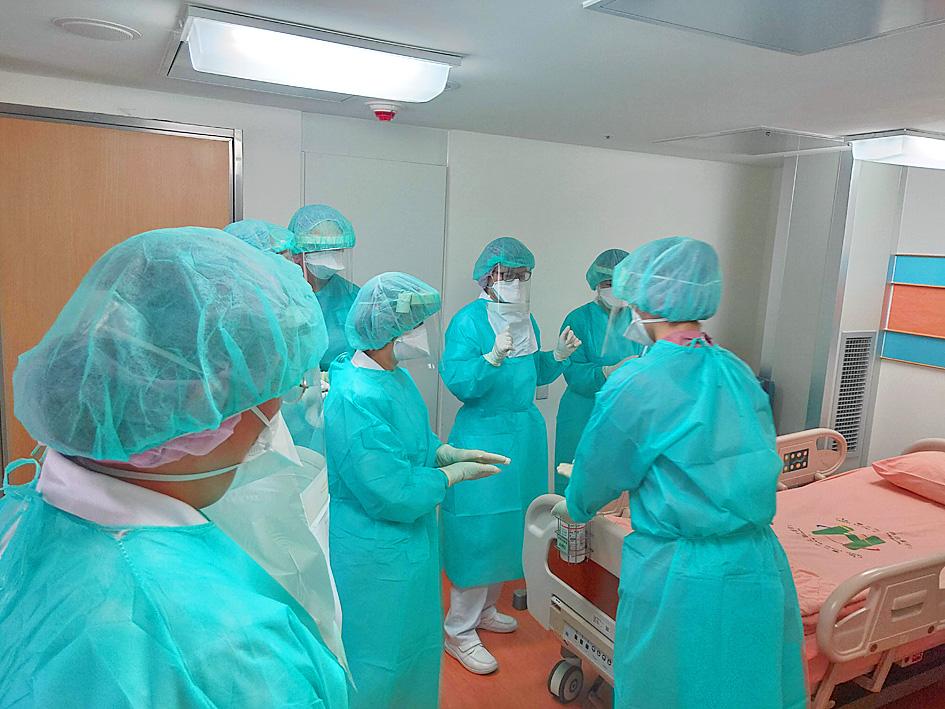The Central Epidemic Command Center (CECC) yesterday announced that more healthcare workers who care for COVID-19 patients would be eligible for subsidies and rewards, and that it would authorize the development of medical supplies for testing and treating the disease.
Minister of Health and Welfare Chen Shih-chung (陳時中), head of the center, said that frontline healthcare workers in emergency rooms (ERs) have been working hard to combat COVID-19, but the first round of subsidies and rewards was not comprehensive enough, so the criteria have been extended to include more hospital staff.
Department of Medical Affairs Director-General Shih Chung-liang (石崇良) said that the Executive Yuan on Friday passed the additional budget and the department has modified the guidelines for the rewards program.

Photo provided by Taipei City Hospital
He said that 200 designated emergency hospitals with enhanced preparedness set up fever screening stations before the Lunar New Year holiday, played an important role in testing and screening suspected cases, and steadily handled an average of about 18,000 emergency cases per day while fighting COVID-19.
Therefore, frontline healthcare workers in ERs with negative pressure isolation wards or single wards who treated suspected or confirmed cases of COVID-19 would be included in the program, Shih said.
Physicians could receive NT$10,000 (US$334.43) per day, with a maximum of two physicians applying per day if there was a shift in duty, he said, adding that nurses could receive NT$10,000 per eight-hour shift, with an extra NT$5,000 for overtime exceeding four hours.
The modified guidelines include special COVID-19 prevention rewards for all workers in the ERs of designated hospitals: NT$1.2 million per month for advanced hospitals and medical centers, NT$900,000 per month for intermediate hospitals and NT$300,000 per month for general hospitals, Shih said.
The workers include medical professionals, radiology technicians, social workers, administration staff, ambulance technicians and custodians, he said, adding that the rewards are retroactive to January.
An additional reward would also be shared between frontline medical professionals who have taken care of hospitalized COVID-19 cases: NT$3,000 per day for those who treated infected patients with pneumonia and NT$10,000 per day for those who treated infected patients on ventilators, Shih said.
Medical facilities with a biosafety level 2 laboratory designated for COVID-19 testing could receive up to NT$5 million for purchasing medical equipment to analyze SARS-CoV-2, which causes COVID-19, he added.
The hospitals should apply for rewards for January through March by May 31, and for April through June by July 10, the CECC said.
In other news, Food and Drug Administration (FDA) Director-General Wu Shou-mei (吳秀梅) said that to meet demand for medical resources in combating COVID-19, it has simplified the review process and waived the Good Manufacturing Practices applications, instead only requiring quality and safety testing for review to help products get to market sooner.
Between Feb. 7 and Thursday, the FDA has approved more than 31 medical supply items for fighting COVID-19, including masks, protective clothing, ear thermometers and test kits, she said.
The FDA also published three reference documents for developers of COVID-19 polymerase chain reaction test kits, rapid test kits and ventilators on its official Web site.

Palauan President Surangel Whipps Jr arrived in Taiwan last night to kick off his first visit to the country since beginning his second term earlier this year. After arriving at Taoyuan International Airport at around 6:30 pm, Whipps and his delegation were welcomed by Minister of Foreign Affairs Lin Chia-lung (林佳龍). Speaking to gathered media, the Palauan leader said he was excited and honored to be back in Taiwan on his first state visit to Taiwan since he was sworn in this January. Among those traveling with Whipps is Minister of State Gustav N. Aitaro, Public Infrastructure

President William Lai (賴清德) yesterday thanked Palau for its continued support of Taiwan's international participation, as Taipei was once again excluded from the World Health Assembly (WHA) currently taking place in Switzerland. "Palau has never stopped voicing support for Taiwan" in the UN General Assembly, the WHO and other UN-affiliated agencies, Lai said during a bilateral meeting with visiting Palau President Surangel Whipps Jr. "We have been profoundly touched by these endorsements," Lai said, praising the Pacific island nation's firm support as "courageous." Lai's remarks came as Taiwan was excluded for the ninth consecutive year from the WHA, which is being held in

RESOLUTIONS DEBATE: Taiwan’s allies said that UN and WHA resolutions cited by China and other nations ‘do not determine Taiwan’s participation in WHO activities’ A proposal to invite Taiwan to this year’s World Health Assembly (WHA) was rejected on Monday, resulting in Taipei’s absence from the annual meeting for a ninth consecutive year, although partners spoke up for Taiwan’s participation at the first day of the meeting. The first agenda item after the opening was a “two-on-two debate” on a proposal to invite Taiwan to participate at the WHA as an observer. Similar to previous years, two countries made statements in favor of the proposal, while two others expressed their opposition. Philippine Secretary of Health Teodoro Herbosa, president of the 78th WHA, accepted the WHA General Committee’s

At least three people died and more than a dozen were injured yesterday afternoon when a vehicle struck a group of pedestrians in New Taipei City’s Sansia District (三峽). The incident happened at about 4pm when a car rammed into pedestrians at an intersection near Bei Da Elementary School. Witnesses said the sedan, being driven at a high speed, ran a red light, knocking scooters out of the way and hitting students crossing the road before careening into a median near the intersection of Guocheng and Guoguang streets. The incident resulted in three deaths and 13 injuries, including the driver, a 78-year-old man